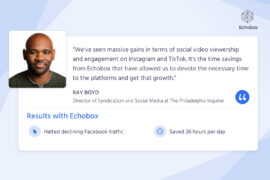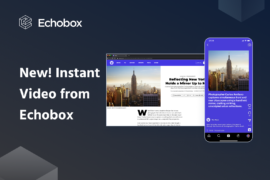How can AI be applied to benefit the news industry? Echobox’s CTO Dr Marc Fletcher explains how we’re using AI to help online publishers.
When you’re building a technology for publishers, it’s important to consider the broader changes that are disrupting the industry right now. Across the board, publishing revenues are falling. There is an unsettling and real question about the future of the news industry and the sustainability of independent journalism. People are buying fewer newspapers and finding their news online for free. Currently an important proportion of revenue that the publishing industry receives comes from ad impressions on their websites.
What’s interesting within online consumption of news is where the growth in traffic is coming from. Increasingly people are getting their news from Facebook and Twitter, and finding stories based on what their friends are talking about. Driving more revenue for online publishers is about optimising their presence on social media (and optimising in terms of reach and link clicks to the publisher’s site). This is where we chose to focus our technology.
Picking the right content to share by intuition throughout the day is challenging. Picking the optimum minute of the day using intuition is nearly impossible. It gets even more difficult to consider the competing demands of different articles and to schedule them all so that each story has sufficient space whilst capitalising as much as possible for peaks in when a publisher’s audience are online.
A typical person can take perhaps a couple of different variables into consideration when trying to predict the performance for a social media post. However, for a machine the number of variables can be nearly infinite. Only an intelligent machine has the ability to predict with a high accuracy how much reach and link clicks a post will generate. Echobox has developed an AI platform that takes a large quantity of variables into account and analyses them in real time to determine optimum post performance.
We do this in a number of ways. When a publisher uses Echobox, their stories are automatically inputted into our algorithm. Our algorithm scans those stories in real time and assigns a score to each — how likely a story is to do well. It can assess all the stories at the publisher’s disposal and create a schedule order that will optimise click-throughs on social throughout the day.

Working with an AI throws up interesting logistical questions that challenge our human assumptions of the best way of doing things. Clients frequently tell us that they need a constant stream of news throughout the day, and we’ve built the algorithm to accommodate for that. But, on a purely technical point of view, clustering more news around peak times, like commuting hours, would be the most effective in terms of traffic.
Then there’s always the complexity inherent to optimising for a closed source system like Facebook. Changes in the Facebook algorithm have achieved almost mythic status, largely because of their unpredictability and often far-reaching ramifications. Changes like Instant Articles demonstrate Facebook’s desire to assimilate news media within their platform (in the same way as they have with Instant Messaging and live video, to name but two). It’s a fair question what Facebook intends to do with news media and what that means for publishers’ revenues, as well as for independent journalism. However, for the moment, Instant Articles seem to provide an interesting new way for publishers to distribute their content, while Facebook syndicates ads within the article and returns those revenues to the publisher. Thankfully, Echobox is fully compatible with Instant Articles.
Developing the technology that we have at Echobox is a brilliantly challenging new frontier of AI — applying Deep Learning capability to the real world problem of the sustainability of digital news. And the aggregate data from our publishers is an intensely interesting data set, a blueprint of how we as a society consume stories today.
Learn more about Echobox, and follow us on Twitter for regular updates @EchoboxHQ.



